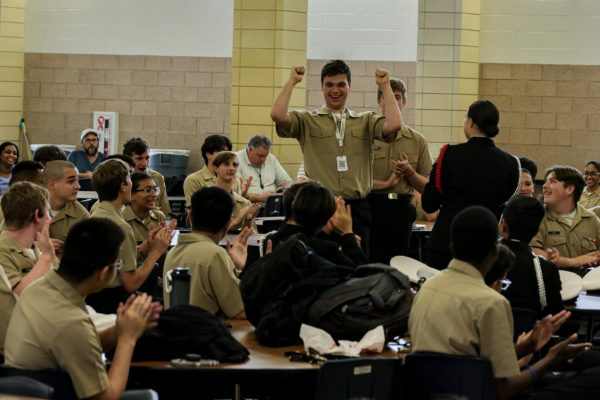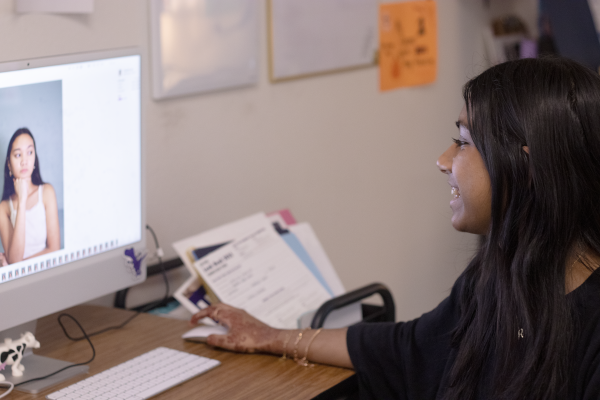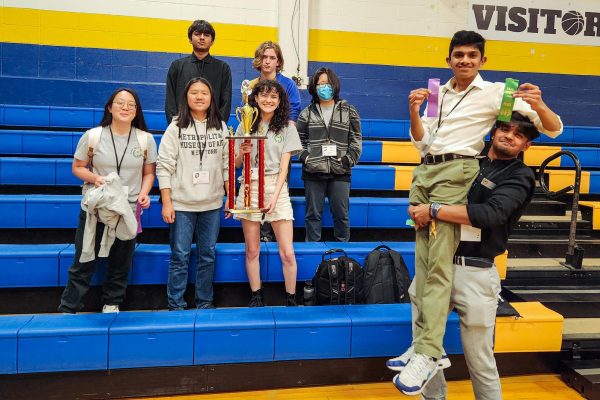Seniors navigate college applications amidst COVID-19 pandemic

Junior Erica Choi studies in the library for her upcoming SATs. Hebron will have a free, in-person SAT for seniors on Oct. 27 because seniors have limited testing availability due to COVID-19.
As colleges modify requirements due to COVID-19, seniors adapt to more holistic, test-optional applications.
Most seniors were unable to take the ACT or SAT after the College Board began canceling tests in March. Many colleges have since announced they will make standardized testing optional for applications as some seniors were not able to complete their testing before application deadlines.
“I think that it is good honestly that colleges [are] taking a more holistic approach to the evaluation that they make on students,” counselor Latasha Rayford said. “I think that your GPA and classes that you take are probably a better reflection of how you are going to do in college anyways.”
Some seniors were still able to complete their testing despite limited options. Since most schools are now test-optional, their scores will not have as much of an impact on their application.
“I might take the ACT this week if it doesn’t [get] canceled,” senior Jocelyn Chu said. “I actually got to take one a few weeks ago. Two or three of my ACTs got canceled, and two of my SATs got canceled. I had to keep rescheduling them, but I think I did a little better since I had more time at home to study.”
The college application process typically consists of a varying mix of essays, standardized testing scores, a high school transcript, recommendation letters and other elements dependent on the school. Without standardized testing scores in applications, college admissions will mainly rely on the student’s high school performance and essays.
“Having the ACT was 100% a benefit for me because I’m a good test taker,” alumni Kate Haas said. “I would guess for schools that have less requirements in the application process, it’s going to be even harder on them, and they might have to add more elements.”
Seniors are adapting to unprecedented circumstances and seem to be handling a different senior year better than expected.
“I have had probably more seniors reaching out, actually tackling their applications than any other year,” Rayford said. “I’m not sure why, but it seems like they are handling the process pretty well. Everybody is kind of jumping on it.”
While some seniors are adjusting to the changes relatively well, others are falling behind due to the difficulty of online school, affecting their previous college plans.
“It’s about the same for me, but I know other people whose grades have dropped because they’re not motivated to study,” Chu said. “They just don’t feel like the teachers are teaching them correctly since everything is new. We’re having to make adjustments, and you have to have a lot of organizational skills and be motivated to do the work.”
For some students, standardized testing was seen as a way to prove themselves to colleges and increase their chance of acceptance despite a lesser academic record. The decision to make test scores optional on applications has greatly affected these students and their college decisions.
“I would not know what to tell kids banking on their test scores because that was me,” Haas said. “I was that kid. The only thing I can say is turn your attention from test taking to writing essays. That’s probably what’s going to be the biggest aspect of your application now instead of your test scores. Definitely utilize every opportunity you have to show why you should be going to that school.”

Senior Kai Fernando is a reporter and this is his second year on staff. He enjoys travelling to foreign countries and learning about other cultures. He...

Senior Jacquelyn Burrer is a reporter and this is her first year on staff. She loves drinking coffee, playing the flute, studying history and reading books.












